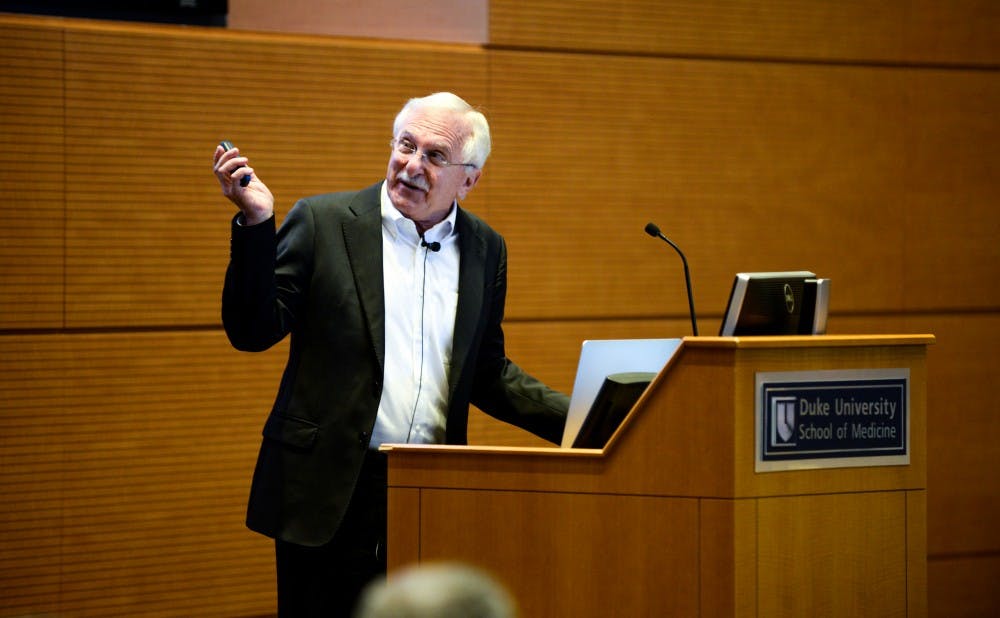Nobel laureate Paul Modrich spoke to the Duke community Wednesday about both winning the prestigious prize last year and his current work with DNA mismatch repair mechanisms in bacteria.
Modrich—James B. Duke professor of biochemistry and a Howard Hughes Medical Institute investigator—elaborated on his research involving DNA repair mechanisms during a talk hosted by the School of Medicine in conjunction with the Office of the Vice Provost for Research. Hundreds of Duke researchers, students and faculty members gathered in the Trent Semans Center for Health Education to hear Modrich's lecture.
After being introduced by President Richard Brodhead, Modrich spoke briefly about learning that he had won the Nobel Prize. Modrich received the Nobel Prize in Chemistry last year, along with Aziz Sancar of the University of North Carolina-Chapel Hill and Tomas Lindahl of the Francis Crick Institute in the United Kingdom.
Dr. Robert Lefkowitz—James B. Duke professor of medicine and professor of biochemistry and pathology—received the Nobel Prize in Chemistry in 2012, making Modrich the second standing faculty member to win a Nobel Prize.
“The best part [about receiving the Nobel Prize] for me is learning that others appreciate your work—everything else I can do without,” Modrich said after an audience member asked how his life had changed after receiving the award.
Modrich then moved on to discuss the origin of his studies and the current forefront of research in DNA mismatch repair. His work has helped establish the functions of proteins involved in the mismatch repair mechanism, and he discussed defects in these proteins as the causes of Lynch syndrome, which places one at higher risk for a range of cancers.
Dr. A. Eugene Washington, chancellor for health affairs and president and CEO of the Duke University Health System, said Modrich’s lecture was reflective of the importance of collaboration in science.
“He told a beautiful and compelling story of following up on insight and being persistent, and he also spoke of teamwork,” Washington told The Chronicle. “When we hear about these big discoveries or leaps, it's often associated with a name or two. But it really is a whole team of people behind that work."
Modrich's speech was met with positive reviews. Nora Peterson, a second-year graduate student, said the talk was an amazing experience for her.
“It’s not every day you get to hear a Nobel Laureate speak,” Peterson said. “It was great to hear him summarize his work. I think it’s a great way of bringing together the different departments and faculty at the Medical School.”
Although it was her first time hearing Modrich speak, she said it would be a good idea for the Medical School to host similar talks in the future. She also noted, however, that she felt the talk was directed towards “a general audience of scientists and doctors.”
Dr. Nancy Andrews, dean of the School of Medicine, said the lecture was not limited to students and faculty in the Medical School. Rather, she said, it was designed for anyone in the Duke community to attend.
"[Modrich] is our second Nobel Prize, and it is important that the community understands his work,” she said.
Abigail Xie contributed reporting.
Get The Chronicle straight to your inbox
Signup for our weekly newsletter. Cancel at any time.

